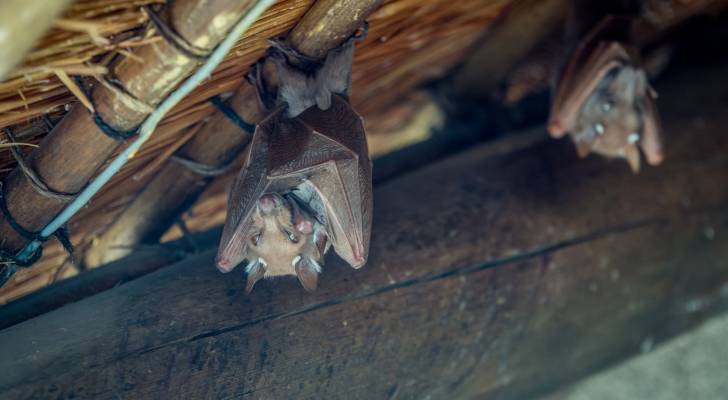
Buying a house is a milestone for many people. But what happens if you discover you’re sharing your new space with hundreds of bats?
This scenario is more common than you might think and can quickly turn into a headache. Bats pose health risks, can cause damage and are not the kind of thing a person trying to sell a house is keen to mention.
Must Read
- Thanks to Jeff Bezos, you can now become a landlord for as little as $100 — and no, you don’t have to deal with tenants or fix freezers. Here’s how
- I’m 49 years old and have nothing saved for retirement — what should I do? Don’t panic. Here are 6 of the easiest ways you can catch up (and fast)
- Dave Ramsey warns nearly 50% of Americans are making 1 big Social Security mistake — here’s what it is and 3 simple steps to fix it ASAP
You check the seller’s disclosure, and they’ve marked "no" for pest issues. However, signs suggest they were aware of the bats’ presence, including the use of foam sealant, which appears to be an attempt to address the issue.
What do you do now?
What options do homeowners have in this type of situation?
A new homeowner who discovers damage to their property has two options: pay for the repairs out of pocket or attempt to force the previous owner to cover the costs.
If the seller falsely claimed the home was free of pests, especially in writing, you may have legal recourse. In most states, home sellers are required to disclose known defects that could impact the house’s livability or value. That typically includes issues like water damage, mold, structural problems and pest infestations. If the seller knowingly hid the bat issue or lied on the disclosure form, they could be held liable for the repair costs or damages.
That said, proving that the previous owners knew about the bats can be challenging. Evidence like prior attempts at sealing entry points, past pest control invoices or statements from neighbors will strengthen your case. A real estate lawyer can help you determine whether you have grounds to sue.
If the issue was truly unknown to the seller (or you can’t prove they did know) and wasn’t visible during the inspection, you may be on the hook for remediation and repair costs. Homeowners’ insurance typically doesn’t cover wildlife removal; however, your policy may cover the cost of damage caused by the bats. Check to see if bats are excluded from the policy or listed under something else, such as vermin. If they aren’t mentioned, the damage they cause could technically be covered.
Read more: Robert Kiyosaki warns of a ‘Greater Depression’ coming to the US — with millions of Americans going poor. But he says these 2 ‘easy-money’ assets will bring in ‘great wealth’. How to get in now
How to avoid a similar situation
Buying a home is stressful enough without worrying about living with a colony of bats. So, what can home shoppers do to prevent a similar situation? Here are a few tips to protect yourself during the home buying process.
Never skip the inspection
When the market is competitive, some homebuyers might forego an inspection to make their offers more appealing. That is a risky move. Always hire an expert to vet the house. If you’re worried the sellers won’t be happy about this, you can reassure them you won’t request concessions for minor issues.
Consider paying for a separate pest inspection
Buyers in areas where wildlife issues are common may want to pay for an additional inspection specifically for wildlife and termites. Pest inspectors are trained to look for evidence such as droppings, nests and other subtle signs of pest infestation.
Request full seller disclosures in writing
Ask for a complete seller disclosure, review it carefully and follow up on anything that seems vague or suspicious. Don’t be afraid to ask specific questions, such as "Are you aware of a colony of bats living in the attic?" Getting the sellers to be specific — and getting proof in the form of a written document — can help if you later need to take legal action.
Get to know the neighbors
Neighbors may know if the house has had past problems with bats, termites, or other pests, or if the previous owners made repeated attempts to seal off parts of the home. You can ask casual but direct questions like: “Have you ever seen wildlife activity around this house?” or “Did the previous owners mention doing any major repairs?”
Buying a home should be exciting, but without doing your due diligence, you could end up with costly surprises. With a little extra effort and a few smart questions, you can avoid unwanted roommates and start your new chapter with peace of mind.
What to read next
- How much cash do you plan to keep on hand after you retire? Here are 3 of the biggest reasons you’ll need a substantial stash of savings in retirement
- There’s still a 35% chance of a recession hitting the American economy this year — protect your retirement savings with these 5 essential money moves ASAP
- This tiny hot Costco item has skyrocketed 74% in price in under 2 years — but now the retail giant is restricting purchase. Here’s how to buy the coveted asset in bulk
- Want an extra $1,300,000 when you retire? Dave Ramsey says this 7-step plan ‘works every single time’ to kill debt, get rich in America — and that ‘anyone’ can do it
Join 200,000+ readers and get Moneywise’s best stories and exclusive interviews first — clear insights curated and delivered weekly. Subscribe now.
This article provides information only and should not be construed as advice. It is provided without warranty of any kind.


